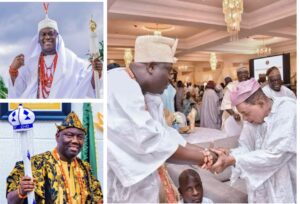
WHY WE MUST DISCONTINUE THE CONTROVERSIAL TUSSLE OF SUPREMACY BETWEEN OONI AND ALAAFIN
WHO IS THE HEAD OF YORUBA LAND?
-Dr Seun Akinde
The age-long debate over who holds the mantle of leadership in Yoruba land—the Ooni of Ife or the Alaafin of Oyo—continues to stir sentiments across communities. While both monarchs wield great historical significance, it is time to settle the matter through facts rather than emotion. The Ooni of Ife, by all historical, spiritual, and cultural standards, stands as the undisputed head of all monarchies in Yoruba land.
Historical Facts Supporting the Ooni’s Supremacy
Ife as the Cradle of Yoruba Civilization
Ile-Ife is universally acknowledged as the ancestral and spiritual home of the Yoruba people. According to mythology, Oduduwa, the revered progenitor of the Yoruba race, descended in Ife and founded the first kingdom. From this sacred city, his children and descendants went on to establish other Yoruba kingdoms, including Oyo, Ijebu, Ondo, Ekiti, and others. As such, the Ooni of Ife, seated in the land of origin, is the direct custodian of Oduduwa’s legacy—preserving both ancestral heritage and spiritual authority.
The Ooni’s Position as the Spiritual Head
While the Alaafin of Oyo is honored for his political and military prominence in Yoruba history, the Ooni remains the spiritual father of the Yoruba people. He presides over sacred rites and cultural festivals deeply rooted in Yoruba cosmology, most notably the Olojo Festival, a globally recognized ritual that symbolizes the link between humanity and the divine. The Ooni bears the revered title “Arole Oduduwa” (Heir of Oduduwa), while all other Yoruba monarchs—including the Alaafin—are traditionally regarded as “Omo Oduduwa” (Children of Oduduwa), further affirming the spiritual primacy of the Ooni.
Pre-Colonial Records and European Accounts
When European explorers and colonial officials encountered Yoruba civilization, they consistently identified Ife as the oldest and most sacred Yoruba kingdom. Colonial records and early missionary journals often referred to the Ooni as the traditional authority and primary figure of Yoruba culture. In fact, when colonial administrators sought to understand Yoruba structure and hierarchy, they were directed to the Ooni—not the Alaafin—as the central figure of Yoruba traditional leadership.
The Alaafin’s Emergence Came After the Establishment of Ife
The Oyo Empire, which gave rise to the prominence of the Alaafin, emerged long after the establishment of Ife. While the Alaafin became a powerful ruler through military expansion and administrative strength, his dynasty is historically one of many founded by Oduduwa’s descendants. This lineage affirms that the Ooni’s position is ancestral, while the Alaafin’s role was a product of later political evolution. Moreover, when the Oyo Empire collapsed in the 19th century due to internal strife and external pressures, the Ooni’s palace in Ife remained the enduring symbol of unity, culture, and continuity for the Yoruba nation.
Recognition by Neighboring Kingdoms: Benin and Warri as Case Studies
The reverence for Ile-Ife and the Ooni’s authority extends beyond Yoruba territories. The ancient Benin Kingdom, one of West Africa’s most formidable civilizations, acknowledges ancestral links to Ife. According to Benin historical accounts, Oranmiyan, a prince of Ife and son of Oduduwa, was invited to rule in Benin and is credited with founding the Oba dynasty—demonstrating Ife’s ancestral and political influence even beyond Yoruba borders.
Similarly, the Warri Kingdom in present-day Delta State, though Itsekiri in language and culture, also traces historical ties to Yoruba roots. The early Itsekiri monarchs (Olu of Warri) had Yoruba ancestry and adopted cultural practices heavily influenced by the traditions of Ile-Ife. These inter-kingdom connections reflect the spiritual and genealogical reach of Ife, further cementing the Ooni’s position as the head and origin of many royal houses across West Africa.
The Ooni’s Unifying Role in Modern Times
In today’s world, the Ooni has continued to play a vital role in promoting Yoruba unity, reconciliation, and global cultural diplomacy. Past and current Oonis have welcomed Yoruba descendants from across the diaspora—Cuba, Brazil, Trinidad, and the United States—affirming Ile-Ife as the spiritual home of all Yoruba people. Leading traditional rulers across the Southwest, including the Awujale of Ijebu, the Alake of Egbaland, and the Deji of Akure, openly recognize the Ooni as the head of Yoruba monarchs. These Obas often travel to Ile-Ife for traditional ceremonies, reinforcing the Ooni’s position as the central figure of Yoruba traditional leadership.
Conclusion: Let History, Not Ego, Define Leadership
The supremacy contest between the Ooni and Alaafin is unnecessary and counterproductive. Historical truth is not determined by sentiment but by facts, tradition, and continuity. The Ooni of Ife stands as the spiritual and cultural head of the Yoruba people, while the Alaafin of Oyo remains a monumental symbol of political heritage. Even ancient powers such as Benin and Warri recognize their genealogical links to Ife, reaffirming its status as the cradle of kingship and tradition in West Africa.
Acknowledging these roles as complementary, rather than competitive, will restore unity, dignity, and harmony among Yoruba communities worldwide.
The strength of Yoruba heritage lies in its unity, and unity thrives where truth is honored above pride.
Let us move beyond rivalry and embrace the truth. Let history—not ego—define leadership. Let us honour our ancestors by preserving the sanctity of Yoruba tradition in truth and unity.
Oduduwa agbe wa o!
Dr. Seun Akinde
Publisher, Tnnnews International Magazine.











